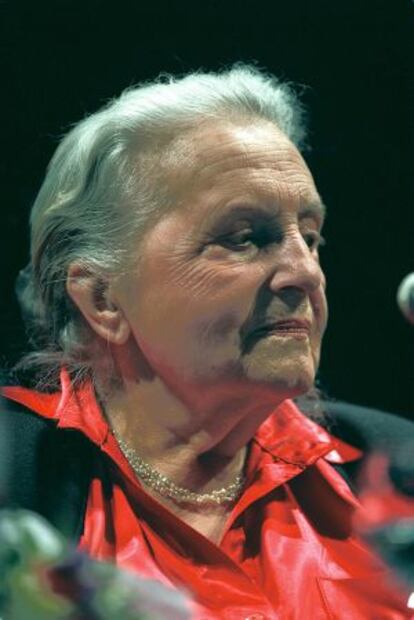Veteran communist Lise London dies at age 96
Lifelong activist and resistance fighter joined the International Brigades

Born in 1916 in France to Spanish parents, she joined the French Communist Party while in her teens, and moved to Moscow, where she met and married Artur London, who would later write about his persecution by Stalin. When the Spanish Civil War broke out in 1936, she and her husband joined the International Brigades.
“That was the best moment in my life,” said Lise London in an interview with EL PAÍS last year at her Paris home about her experiences in Spain during the Civil War. “The Spanish people are always in my memories. I am constantly reminded of the Brigades, of my old friends; I dream about them. Spain was an ideal, our most beloved ideal, and it continues to be a valid ideal.”
After Franco’s victory in 1939, the Londons returned to Paris. During the German occupation, London and her husband fought with the resistance. She was arrested and sent to Ravensbruck concentration camp in 1942.
After the war, she lived in Czechoslovakia with her husband who became deputy foreign minister in a Soviet-backed government. However, he fell from grace and was arrested in 1951 and had to face a Stalinist show trial.
He was freed in 1956 following the death of Stalin, and the couple was able to move to Paris. Over the following decade, London wrote The Confession, a play about his arrest and trial, which was published in 1968, the year of the Prague uprising and that led to the Soviet occupation of Czechoslovakia.
Artur London died in 1986. Outwardly Lise remained loyal to the French Communist Party, while criticizing Stalin. Santiago Carrillo, the former general secretary of the Spanish Communist Party, and who maintained a lifelong friendship with the Londons after knowing them during the Civil War, described the “faith” of the Londons in Communism: “To be a communist was more than just belonging to a party: it was about faith. There was a religious element to it. We wanted to spread the revolution. When you lost faith, everything collapsed. Lise took a long time to lose faith. She had a lot of problems with her husband over it.”
In her final interview with EL PAÍS, she said: “I am a communist, but not in a political sense anymore: I tore up my membership card. I remain a communist out of loyalty to all those comrades who shared our dreams, and who died for freedom.”
Tu suscripción se está usando en otro dispositivo
¿Quieres añadir otro usuario a tu suscripción?
Si continúas leyendo en este dispositivo, no se podrá leer en el otro.
FlechaTu suscripción se está usando en otro dispositivo y solo puedes acceder a EL PAÍS desde un dispositivo a la vez.
Si quieres compartir tu cuenta, cambia tu suscripción a la modalidad Premium, así podrás añadir otro usuario. Cada uno accederá con su propia cuenta de email, lo que os permitirá personalizar vuestra experiencia en EL PAÍS.
¿Tienes una suscripción de empresa? Accede aquí para contratar más cuentas.
En el caso de no saber quién está usando tu cuenta, te recomendamos cambiar tu contraseña aquí.
Si decides continuar compartiendo tu cuenta, este mensaje se mostrará en tu dispositivo y en el de la otra persona que está usando tu cuenta de forma indefinida, afectando a tu experiencia de lectura. Puedes consultar aquí los términos y condiciones de la suscripción digital.








































